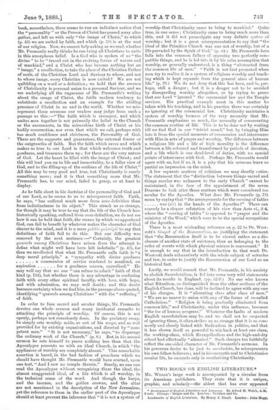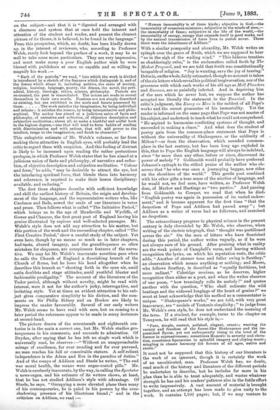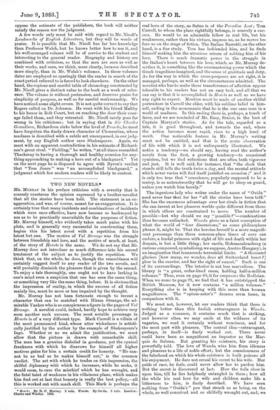TWO BOOKS ON ENGLISH LITERATURE.* Mn. WELSH'S large work is
accompanied by a circular from its American publishers. They state that it is unique, graphic, and scholarly—the ablest that has ever appeared * Divebrpment of English Literature and Language. By Alfred H. Welsh, A.M. 2 vole. Chicago Griggs and Co. London : Trnbner and Co.
Landmarks of English Literature. By Henry J. Nicoll. London: John Hogg. on the subject—and that it is "digested and arranged with a clearness and system that at once hold the interest and
attention of the student and reader, and present the clearest picture of its theme, it is believed, to be found in the language."
From this prospectus, which, no doubt, has been kindly drawn up in the interest of reviewers, who, according to Professor Welsh, rarely look beyond the preface of a work, it may be as well to take some more particulars. They are very impressive, and must make many a poor English author wish he were blessed with publishers at once so capable and so willing to magnify his work :—
"Each of the periods," we read, "into which the work is divided is introduced by a sketch of the features which distinguish it, and of the forces which shape it, including politics, the state of society, religion, learning, language, poetry, the drama, the novel, the periodical, history, theology, ethics, science, philosophy. Periods are re-created, the past is resuscitated. The actors are made to reveal themselves in their own words. Passions ale not simply described as existing, but are exhibited in the souls and hearts possessed by -them The work satisfies the imagination, by being individual and minute ; it satisfies the reason, by being interpretative and philosophical. The author has aimed at a judicious union of facts and philosophy, of narrative and reflection, of objective description and -subjective meditation ; above all, to make a truthful and useful book in the highest degree,—one that will tend to form habits of reading with discrimination and with ardour, that will add power to the intellect, range to the imagination, and finish to character."
This eulogistic estimate of Mr. Welsh's volumes, so far from making them attractive in English eyes, will probably lead the critic to regard them with suspicion. And this feeling of distrust is likely to be increased upon reading the rather pretentious .prologne, in which Professor Welsh states that he has aimed at a judicious union of facts and philosophy, of narrative and reflec
tion, of objective description and subjective meditation. "Colour and form," he adds, "may be desirable to attract. the eye, but the interlacing spiritual force, that blends them into harmony
and coherence, is required to make their lesson disciplinary, available, and enduring."
The first three chapters describe with sufficient knowledge .and skill the earliest history of Britain, the origin and development of the language, and the representative writers who, like Caedmon and Bede, sowed the seeds of our literature in verse and prose. Then follows what is called "The Initiative Period," which brings us to the age of Mandeville and Wycliffe, of Gower and Chaucer, the first great poet of England having his genius illustrated by copious and well-selected passages. Mr. Welsh's style does not add any attraction to his matter, but this portion of the work and the succeeding chapter, called "The First Creative Period," show a careful study of the subject. Yet even here, though by no means so much as in later chapters, bad-taste, absurd imagery, and the grandiloquence so often mistaken for eloquence, are conspicuous features of the narrative. We may let Mr. Welsh's inaccurate assertion pass when he calls the Church of England a flourishing branch of the Church of Rome, but he loses his head altogether when he describes this branch as "shooting forth in the open air, amid satin doublets and stage attitudes, amid youthful bluster and fashionable prodigality." The account of the literature of the Tudor period, although without novelty, might be read with interest, were it not for the author's jerky, interrogative, and irritating style. Yet at times an evident attraction to his subject gives comparative simplicity to his diction, and the comments on Sir Philip Sidney and on Hooker are likely to impress the reader favourably. Several of our early writers Mr. Welsh seems to have read with care, but on coming to a later period the references appear to be made in many instances at second-hand.
The picture drawn of the seventeenth and eighteenth centuries is in the main a correct one, but Mr. Welsh studies grotesqueness in his comments, and succeeds to admiration. Of
Dryden, after saying that he has left no single work which is amiversally read, he observes :—" Without an unapproachable mirage of excellence, for ever receding and for ever pursued,
no man reaches his full or conceivable stature. A self-reliant independence is the Adam and Eve in the paradise of duties." And of the essays of Addison and Steele he writes, "The end was moral health, the means were sugar-coated pills." Mr.
Welsh is carelessly inaccurate, by the way, in calling the Spectator 'a news-organ, and his estimate of its writers shows, at least, that he has not studied Addison's style with advantage. Of Steele, he says, "Occupying a more elevated plane than many of his contemporaries, he is paled in his powers by the overshadowing presence of his illustrious friend ;" and in the criticism on Addison, we read :—
"Human immortality is of three kinds ; objective in God,—the immortality of conscious existence ; subjective in the minds of men,— the immortality of fame; subjective in the life of the world,—the immortality of energy, energy that expends itself in good works, and by the natural transmission of force lives to perish never. These three were the inheritance of Addison."
With a similar pomposity and absurdity, Mr. Welsh writes an epitaph over the grave of Swift, which we are supposed to hear "as in the sigh of the wailing wind." "This hideous treatise, so shudderingly calm," is the exclamation called forth by The Modest Proposal, and we are told that Swift was constitutionally incapable of religion. "Joy is wanting, save the joy of tearing."
Defoe is, on the whole, fairly estimated, though no account is taken
of the six letters which reveal his political tergiversation, nor of the grossness with which such works of his old age as Moll Flanders and Roxana, are so painfully infected. And in depriving him of the ears which he never lost, we suppose the author has accepted too literally the statement in the Dunciad. In the critic's judgment, the Essay on Man is the noblest of all Pope's works and the surest guarantee of his immortality. Yet the
reader is informed on the same page that Pope was not master of his subject, and undertook to teach what he could not comprehend. "He aspired to harmonise conflicting systems of thought, and succeeded in making a chaos." And what does the student of poetry gain from the common-place statement that Pope is without the universality of Shakespeare, or the sublimity of Milton ?—or from the observation, which sounded common place in the last century, but has been long ago exploded in this, that to Pope the English language will always be indebted, since "he more than any other, before or since, discovered its power of melody " ? Goldsmith would probably have preferred Johnson's epitaph to the stilted praise of the author who observes that "he who was once a journeying beggar, now rides on the shoulders of the world." This gentle poet combined with his other gifts a true sense of the niceties of language, and he would not, we feel sure, have written, as Professor Welsh does, of Marlow and Hastings as "two parties." And passing from Goldsmith to Cowper, we read that when he died, "English poetry was again in possession of its varied endowment," and it became apparent for the first time "that the despotism of Pope and Addison had passed away " ; but Addison as a writer of verse had no followers, and exercised no despotism.
The extraordinary progress in physical science in the present century is duly chronicled by Mr. Welsh, who observes, when writing of the electric telegraph, that "thought was postilioned across the air." On the men of letters who have flourished during this period, the author writes vaguely, as if he were not always sure of his ground. After praising what in reality are the weak points of Campbell's verse, and leaving without recognition the lyrics, on which his reputation rests, the critic adds, "Another of sterner tone and fuller swing is Southey," an observation which means anything or nothing; and Moore, who follows Southey, is described as "equally factitious, but more radiant." Coleridge receives, as he deserves, higher recognition than either as a poet, and when the writer observes of one poem, "how trancingly rolls its melody !" and quotes another with the question, "Who shall estimate the wild beatings and the widowed longings of the heart of genius ?" we must at least acknowledge that his method as a commentator is unique. "Shakespeare's works," we are told, with very great inaccuracy, are "models of Teutonic simplicity ; " to judge from Mr. Welsh's own style, he does not understand the meaning of
the tern,. If a student, for example, turns to the chapter on Tennyson, he will read that his style is,— "Pure, simple, correct, polished, elegant, ornate ; wanting the variety and freedom of the forest-like Shakespeare and the impassioned Byron, yet not unfrequently rising to the level of the former in expressiveness ; sometimes Homeric in severity and elevation, sometimes Spenserian in splendid imagery and cloying music ; mingling in chaste harmony the flowers of all ages, native and exotic."
It must not be supposed that this history of our literature is the work of an ignorant, though it is certainly the work of an uncultivated, man. Professor Welsh has, no doubt, read much of the history and literature of the different periods he undertakes to describe, but he includes far more in his plan than he is able to treat adequately, and wastes whatever strength he has and his readers' patience also in the futile effort to write impressively. A vast amount of material is brought together, and an attempt has been made to give unity to the work. It contains 1,100 pages ; but, if we may venture to cppose the estimate of the publishers, the book will neither satisfy the reason nor the judgment.
A few words only must be said with regard to Mr. Nicoll's Landmarks of English Literature, but they will be words of praise. It is possible that Mr. Nicoll has far less knowledge than Professor Welsh, but he knows better how to use it, and his well-arranged volume will be of service to the student and interesting to the general reader. Biography and history are combined with criticism, so that the men are seen as well as their works, and seen, we think, more clearly, because described more simply, than in Mr. Welsh's volumes. In those volumes dates are employed so sparingly that the reader in search of the exact period referred to is forced to look elsewhere. On the other hand, the copious and careful table of chronology constructed by Mr. Nicoll gives a distinct value to the book as a work of reference. The volume is without pretension, and deserves praise for simplicity of purpose, as well as for careful workmanship. We have noticed some slight errors. It is not quite correct to saythat Rogers called on Dr. Johnson. He went with his friend Maltby to his house in Bolt Court, but on reaching the door their courage failed them, and they retreated. Mr. Nicoll rarely goes far wrong in his criticisms ; but in saying that in Sir Charles Grandison, Richardson sinks below the level of Pamela, he must have forgotten the finely-drawn character of Clementina, whose madness is described with a subtle art unsurpassed, in our judgment, by any English author save Shakespeare. Again, we meet with an apparent contradiction in his estimate of Richardson's great rival. "Fielding," he writes, "at all times resembled Thackeray in having a thorough and healthy aversion for anything approaching to making a hero out of a blackguard." Yet on the next page he is disposed to agree with Byron's verdict that "Tom Jones" was "an accomplished blackguard," a judgment which few modern readers will be likely to contest.




































 Previous page
Previous page